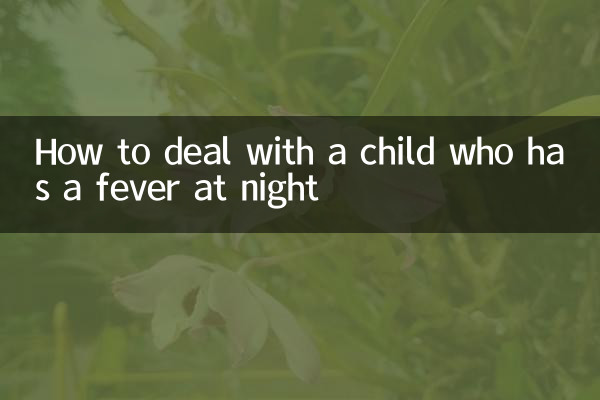How to deal with a child who has a fever at night
A child's fever at night is an emergency that many parents encounter, especially in autumn and winter or when the seasons change. Faced with this situation, parents need to stay calm and adopt a scientific approach. The following is a compilation of the popular topics on the Internet in the past 10 days about "children having fever at night", including symptom diagnosis, treatment methods, medication suggestions and precautions, to help parents cope with it better.
1. Judgment of symptoms of fever

Fever is the body's natural response to fighting infection, but the severity needs to be judged based on your child's age and body temperature. The following are body temperature standards for children of different ages:
| age group | Normal body temperature range (℃) | Low fever (℃) | High fever (℃) |
|---|---|---|---|
| 0-3 months | 36.5-37.5 | 37.6-38.0 | ≥38.1 |
| 3 months-3 years old | 36.5-37.5 | 37.6-38.5 | ≥38.6 |
| 3 years and above | 36.0-37.2 | 37.3-38.5 | ≥38.6 |
2. Emergency treatment steps for fever at night
If a child has a fever at night, parents can follow the following steps:
1.Measure body temperature: Use an electronic thermometer or ear thermometer to measure your temperature. Avoid using mercury thermometers (which are fragile and unsafe).
2.physical cooling: If the body temperature is lower than 38.5℃, you can try physical cooling:
3.Medication to cool down: If the body temperature exceeds 38.5℃, or the child has obvious discomfort (such as crying, headache), you can take antipyretics:
| Drug name | Applicable age | dose | Interval time |
|---|---|---|---|
| Acetaminophen (such as Tylenol) | ≥3 months | 10-15mg/kg | Every 4-6 hours |
| Ibuprofen (such as Motrin) | ≥6 months | 5-10mg/kg | Every 6-8 hours |
3. Under what circumstances do you need immediate medical treatment?
The following situations require medical attention as soon as possible:
4. Common misunderstandings among parents
1.Cover sweat to reduce fever: Wearing too much when a child has a fever will hinder heat dissipation and aggravate the condition.
2.Abuse of antibiotics: Fever is mostly caused by viral infection, and antibiotics are ineffective against viruses.
3.Alternate use of fever reducers: Alternating use of acetaminophen and ibuprofen is not recommended unless directed by your doctor.
5. Preventive measures
1. Keep warm and prevent children from catching cold.
2. Maintain indoor air circulation and avoid going to crowded places.
3. Get preventive vaccines such as influenza vaccine.
4. Eat a balanced diet to enhance immunity.
Summary: When a child has a fever at night, parents should observe calmly and deal with it scientifically. If the condition is severe or persists, seek medical attention promptly to avoid delaying treatment.

check the details

check the details